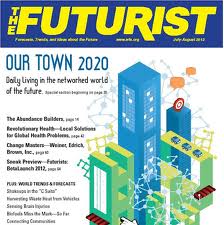In the July-August issue of The Futurist (www.wfs.org) there was an interesting article on the shift from ‘smart houses’ to ‘networked houses’. Authors Chris Carbone and Kristin Nauth describe how tomorrow’s integrated, networked and aware home systems will forever change family life. Viewed from the vantage point of the future, current homes will resemble caves.
 Carbone and Nauth track 10 technology trajectories underpinning this domestic transformation:
Carbone and Nauth track 10 technology trajectories underpinning this domestic transformation:
1. Adaptive environments. For example,having ‘smart surfaces’ within the home that adapt to various uses to which they are subjected.
2. Cloud intelligence. The ability to tap into information, analysis and contextual advice in more integrated ways.
3. Collaboration economy. The outworking of ‘collective intelligence’ that enables us to accomplish tasks not easily handled by virtual agents and machines in the cloud. In other words it will mean accessing advice and recommendations by tapping into the social graph.
4. Contextual reality. We will navigate through our daily activities thanks to multiple layers of real-time and location-specific information.
5. Cutting the cable. Untethering personal devices from wired power and data connections. Access to the Internet will be ubiquitous. How welcome would this advance be for those of us constantly looking for misplaced adaptors and power cables!
6. Information fusion. The ability to generate useful personal information by fusing available data. This personal data will become comprehensible through visualization and other services.
7. Interface anywhere, any way. Freedom from conventional input devices such as keyboards, remotes, mouse, screen etc…
8. Manufacturing 3.0. Manufacturing will be reconceived – from a far-flung, global activity to more of a human scale and re-localized endeavour.
9. Personal analytics. This information will become a consumer tool as much as a business tool. We’ll collect, store, interpret and apply vast amounts of personal data being created by and about ourselves during our everyday activities.
10. Socially networked stuff. Many of our possessions will interact with each other and with the broader digital infrastructure.
What is interesting about these technological advancements is that societal drivers underpin them. This of course is where our message as TomorrowToday intersects with the ideas put forward in The Futurist. The ‘coming of age’ of the Digital Natives will see an exponential increase in the use of such technologies as is evidenced already by the use and dependence on social technologies. We are talking about a generation who have grown up in a world where interaction with technology is normal or as Carbone and Nauth write, ‘where building, modifying, and hacking consumer technology is taken for granted’. This changes everything that we can anticipate about the future and if it applies to the home, think about the implications for the work place! In fact ‘work place’ will take on a completely new meaning and will in reality, come to mean pretty much anywhere!
Digital Natives will drive this revolution and we have been repeatedly warning business leaders about what to expect when (it is not an ‘if’) this revolution washes upon their shores. The other day a colleague of mine, in speaking to a room full of CEOs, challenged them as to why wouldn’t they provide this generation arriving at their doorstep with the best technology available and free them from policy that shackles them in their use of it? To do otherwise simply makes no sense at all! Yet, that is exactly what invariably happens in our current work environments! We deny some of our staff the tools they are best equipped to work with and ground them through IT policies that should rather enable them to soar!
People drive technology. It is a mind-shift more than anything. The kinds of technological advances described in The Futurist might not all take the shape and form we anticipate. There will be surprises. However, what we can be certain of is that the future isn’t what it used to be and to be forewarned is to be forearmed.
Best then we get ready!



Trackbacks/Pingbacks